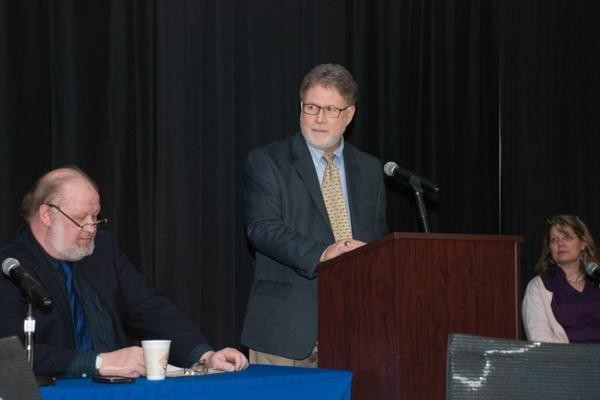That is one of the topics that connected nearly 200 university and community members to the Civil War's history in the second of three events in the University of North Georgia's (UNG) "Civil War at 150" series, held on the university's Gainesville Campus recently. In this part of the series, history faculty examined effects and significance of the Civil War.
"One modern definition of a disaster says the event must include at least 100 human deaths, 100 human injuries and a minimum of $1 million dollars in property damage to be classified as a disaster," Dr. Clay Ouzts said in discussing how the war affected Georgia's environment.
An exact figure for Atlanta's death toll during Sherman's attack has never been produced, but there were an estimated 100 deaths, a single surgeon claimed to have performed 107 amputations during the assault, and Sherman estimated that $100 million dollars in damage was done to the city. Using photographs, Ouzts drew parallels between Atlanta's destruction and the damage Hurricane Katrina left in its wake in 2005.
Dr. George Justice began the discussion with a brief look at Georgia's role in shaping events centered on state's interests, such as the special conventions that led to Georgia's secession from the Union.
"It was seen as an issue of state's rights versus a tyrannical federal government," Justice said.
Citing a modern example, Justice said Alabama's choice to ignore a recent federal ruling forcing it to allow same-sex marriages is nullification, whereby a state passes over federal rulings because it views the ruling as harmful to the state. Nullification became a common concept in the years leading up to the Civil War, he said, and he discussed how state actions impacted the nation's federalism.
Jumping from the pre-war era to the post-war era, Dr. Ben Wynne discussed the South's methods for dealing with the loss and trauma of the war.
"The white South basically denied the war's outcome and tried to rebuild by pretending the military loss did not matter, because they felt the South could still maintain its way of life," Wynne said.
Wynne showed images of the rebel flag, war monuments and several groups celebrating confederate veterans and heritage, icons that he said supported and perpetuated the view of denial.
Showing a different side to the South's turmoil in the post-war, Dr. Jennifer Lund Smith examined the hardships freed slaves faced during Reconstruction.
"During Sherman's March, fleeing slaves followed his army as he cut his way through the South," Smith said. "It was at this point that people began to consider how the nation might absorb 4 million freedmen."
That absorption came with barriers established by southerners attempting to bar the black community from assimilating, Smith said, such as the poll tax, which most black voters could not afford.
Glen Kyle, executive director of the Northeast Georgia History Center and a faculty member at UNG, facilitated the panel.
The series concludes April 9 with Dr. J. David Hacker, an associate professor of history at the University of Minnesota. His presentation, "The Human Cost of the American Civil War," details his 2012 study that increased the death toll of the nation's deadliest war to 750,000. The program is free and open to the public and will be in the Cleveland Ballroom in the Martha T. Nesbitt Building on UNG's Gainesville Campus. The program begins at 6 p.m. with a reception beforehand at 5:30.
All three sessions will be recorded and posted online at https://video.ung.edu/Playlist/civilwar.
The series is supported by a grant from the Georgia Humanities Council and the National Endowment for the Humanities and through appropriations from the Georgia General Assembly. Additional support is provided by the Northeast Georgia History Center in Gainesville and UNG partners, including the College of Arts and Letters; the Department of History, Anthropology, and Philosophy; the Center for Teaching, Learning, and Leadership; and the UNG libraries.

Dr. George Justice addresses nearly 200 people at the start of UNG's second event in its "Civil War at 150" series. The event featured four UNG history faculty who presented unique looks at how the war affected Georgia. (Also in photo are Dr. Ben Wyn
http://accesswdun.com/article/2015/3/286469
